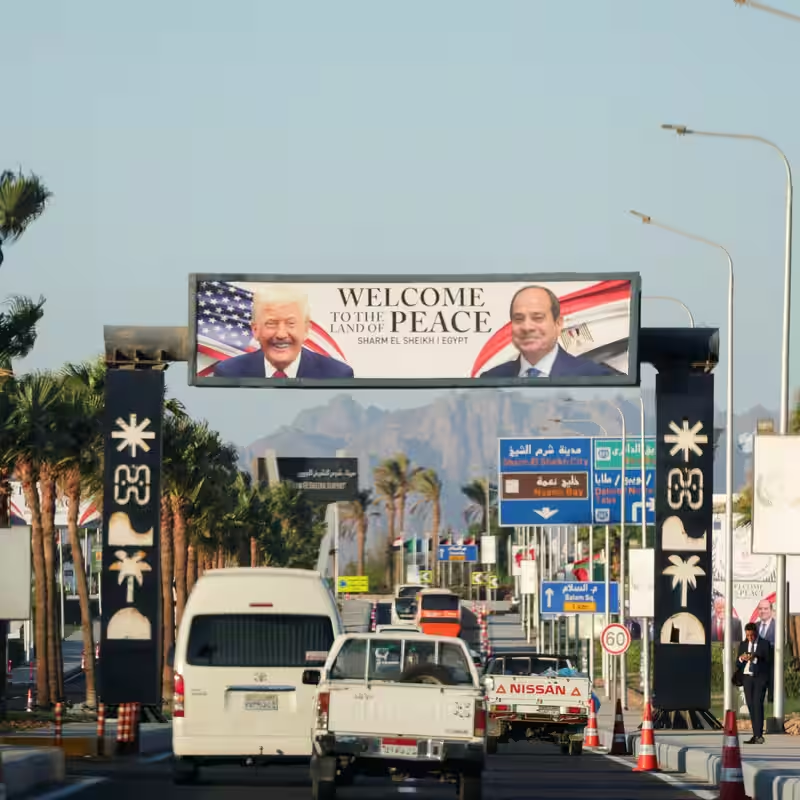Table of Contents
- A High-Stakes Peace Summit in Sharm el-Sheikh
- Netanyahu Declines Invitation Citing Religious Holiday
- Trump’s Return to Middle East Diplomacy
- Ceasefire Begins—But Hard Talks Lie Ahead
- Why This Summit Matters for Regional Stability
- Sources
A High-Stakes Peace Summit in Sharm el-Sheikh
On Monday, October 13, 2025, the Egyptian resort city of Sharm el-Sheikh transformed into a diplomatic nerve center as more than 20 world leaders gathered for an “International Peace Summit” aimed squarely at ending the war in Gaza. Hosted by Egyptian President Abdel Fattah el-Sisi and former U.S. President Donald Trump, the event was billed as a pivotal moment to lock in a fragile ceasefire and chart a path toward lasting peace.
Banners lining the roads declared Sharm el-Sheikh the “City of Peace,” echoing its historic role in past Middle East negotiations. The summit’s timing followed the implementation of a new ceasefire deal that began earlier that morning, involving the exchange of Israeli hostages for Palestinian prisoners—a first step in a broader U.S.-backed proposal unveiled by Trump in September.
Netanyahu Declines Invitation Citing Religious Holiday
In a last-minute twist, Israeli Prime Minister Benjamin Netanyahu announced he would not attend the summit. Though Egypt’s government initially stated he was expected to join, Netanyahu cited the Jewish holiday of Shemini Atzeret—beginning that evening—as the reason for his absence.
“While I appreciate the invitation from President Trump, I cannot attend due to the sanctity of the holiday,” Netanyahu said in a brief statement. Critics, however, questioned the timing, noting that high-level Israeli delegations often operate during religious observances when national security is at stake.
Netanyahu’s absence left Palestinian Authority President Mahmoud Abbas as the sole representative of the Israeli-Palestinian conflict’s core parties at the table—raising concerns about the summit’s ability to produce concrete next steps without direct Israeli engagement.
Trump’s Return to Middle East Diplomacy
Donald Trump’s presence marked a dramatic return to international peacemaking. Having brokered the Abraham Accords during his presidency, Trump positioned himself once again as a central player in Middle East negotiations. He arrived in Sharm el-Sheikh after a short visit to Israel earlier in the day.
Alongside Egypt’s el-Sisi, Trump co-chaired the summit, which included leaders from France, Britain, Germany, Pakistan, Qatar, and Turkey—as well as top officials from the United Nations, the European Council, and the Arab League.
Ceasefire Begins—But Hard Talks Lie Ahead
The ceasefire that took effect Monday morning represents only Phase One of a multi-stage plan. Future negotiations must tackle far thornier issues: a full Israeli military withdrawal from Gaza, the disarmament of Hamas, and the role of the Palestinian Authority in governing post-war Gaza.
Hamas was notably absent from the summit—an intentional exclusion, given its designation as a terrorist organization by the U.S. and others. Yet its cooperation remains essential for any durable peace, creating a paradox diplomats are struggling to resolve.
Why This Summit Matters for Regional Stability
Egypt, long a mediator between Israel and Palestinian factions, hopes the Sharm el-Sheikh gathering will revive its legacy as a peace broker. The summit also reflects a broader regional desire to prevent further escalation that could draw in Hezbollah, Iran, or other actors.
While the one-day event may not yield a final agreement, diplomats acknowledge that sideline talks could lay the groundwork for future breakthroughs. As one European envoy put it: “Peace doesn’t happen in a conference hall—it happens in the corridors between them.”




